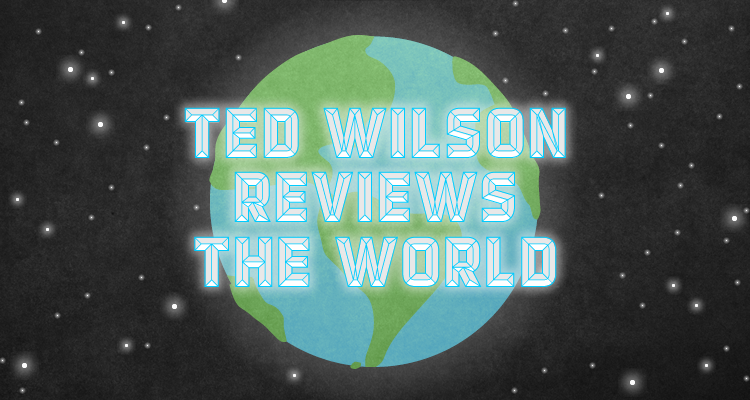interviews
The Mundane and the Dramatic are Neighbors: An Interview with Vincent Scarpa

by Michelle King

I was introduced to Vincent Scarpa through a mutual friend, who suggested that based on our shared interest in literature and writing, we should talk. Matchmaking — even of the platonic sort — doesn’t always work out, but, in our case, it did. We bonded over the different projects we were working on, our recent heartbreaks, and our shared affinity for Maggie Nelson. I liked Vincent instantly, and when I finally read his writing, I liked it just as much. His short story “You’re Home Early,” out this week from Recommended Reading, is one of my favorite stories of his. Annie, a divorced orthodontist from Chicago, returns to her home state of Texas to see her father the day before he is executed for first-degree murder. Annie’s grief takes on a curious form. There’s no mourning, no crying. Instead, there’s sleeping with motel managers, and making callous (albeit clever) jokes about God, and buying stale chips from a vending machine. It showcases what Vincent does best — show how even life’s most emotional moments are punctuated by routine ones. It was such a pleasure to chat with Vincent and ask him a few questions about his process over email.
Michelle King: I loved this story so much. One of the things that stood out to me was the dichotomy between this seemingly disaffected character and this very emotional event. In the hands of a less skilled writer, this might have turned into a mawkish, melodramatic story. We don’t see Annie having some great revelation where she comes to terms with her past. We don’t see her suddenly understanding or forgiving her father. We see her numbing the pain with lots of beer and a deeply depressing one-night-stand. But we know that she is masking a great deal of pain. After all, there is still something that brought her back to Huntsville — if she was really as cold and callous as she claims to be, she would have just stayed in Chicago. How did you go about capturing this sort of feigned detachment — this defense mechanism detachment — while still imbuing the story with emotion? And, on a related note, how were you able to balance the emotion of the story without slipping into over-sentimental territory?
Vincent Scarpa: Well, first of all, thank you for all you say here. A lot of the characters in my stories are like Annie: dispassionate, stubborn people who have invented flimsy but semi-tenable shelters for themselves; isolated spaces in which they allow only what they can tolerate. I recognize myself as having the capacity and the tendency to do the same, and perhaps that’s why I’m attracted to writing these characters. The challenge of the story, then, is to force them — in a way that doesn’t feel contrived or convenient — to make a kind of contact with their pain. I hope that’s what’s achieved in “You’re Home Early.” I like thinking of Annie as being both more willing and more fragile than she lets on, and I tried to let those moments breathe in the story where we see her contemplating the possibilities and the implications of what is ahead of her. A good deal of her is on autopilot, of course, but she acknowledges that the reason she’s heading to Huntsville for her father’s execution “may be as complicated as because he asked her to.” She knows parts of her are still tethered to that past, that life.
Elizabeth McCracken, a mentor of mine and a bonafide genius, often says, “Don’t let the character’s bad habits become the story’s bad habits,” and that’s something I try to remind myself of in the drafting process. I’m not sure I can articulate exactly how one goes about that — how one imbues a story with emotion when the protagonist is actively dodging it — but I think it does have something do with nuancing the fuck out of your character, finding the best strategies to make transparent their dispassion until the reader can see what is behind it. This must be done with a light hand.
MK: The first time I met you I learned that Joy Williams is your favorite writer and now that I’m more familiar with her work (thanks to you), and your work, I’m not at all surprised. You both manage to show how life’s more dramatic moments are still surrounded by deeply mundane moments, simply because that’s life. Annie walks toward the site of where her father is being executed and an hour later she’s going to be standing in line at the airport, taking her laptop out of her bag and making sure she didn’t leave her water bottle in her purse. You write, “No somber downpour, no flock of birds. No rainbows. The minute passes like the one before and after it.” When you’re crafting a story, are you actively avoiding writing big, histrionic moments?
VS: I like that vision of where Annie is headed next. And yes, the mundane and the dramatic are neighbors, in life and in fiction. No writer captures this better than Joy Williams. As in her novel, State of Grace, where the narrator, while watching her lover crash his car, still remarks, “Grady did not once touch the brakes, which was commendable.” I’m a firm believer that there isn’t a writer better than Joy Williams, and with the release of The Visiting Privilege this week, I’m hoping she finds a whole new audience, an audience that does not yet know the state of impoverishment they are in.
Regarding that marriage of the mundane and the dramatic, I think we often forget that no event is so big as to disrupt our lives completely, despite how all-consuming it might feel at the time. An unsavory way of saying this is that a mother who has just lost a child in a drunk-driving accident still has to take a shit at some point, you know? Our bodies persist, uncaring, and so does the world. If I avoid writing, as you say, “big, histrionic moments,” maybe it’s because they don’t feel terribly organic or familiar to me. As if all the pain comes out at once, out at the right moment!
MK: I am very interested in why you chose the murder you chose. Why, to steal from your vernacular, a “brutally creative first-degree murder” rather than just a brutal one? What is it about the creative part that was important to you? What did that add to Elliott’s character?
VS: You know, it started, as some things do, with a nightmare, in which I more or less dreamed the details of that murder. I woke up sort of sick with myself, worried by having a brain that went to such a grim place when unattended. So of course I decided I must write it. And I think in this case, the nature of the murder serves to further nuance Elliott, and perhaps gives the reader a deeper sense of the degree to which he has become unmoored from his own sanity. If he had simply shot the boy, I don’t believe I would have been able to achieve that kind of effect. I wanted Elliott to be more than a caricature, I guess, and that involved giving the story permission to allow in this terrible nightmare, to let it become his dream, his course of action. I suppose I wanted, too, to exorcise myself of it. Which is maybe all we’re doing when we’re writing fiction: trying to contain elsewhere the horrific dream.
King: You grew up in New Jersey, you went to undergrad in Boston, you’re getting your MFA in Austin, and you’ve spent quite a bit of time in Florida. How have those spaces shaped or informed your writing? Did moving from the northeast to the south affect your writing in any significant way?
Scarpa: That’s an interesting question, whether or not my writing has changed since moving to the South. I’ve gotten better, I hope. And I’ve written a Texas story! But if there’s a relationship between my writing and my location, I think it probably has less to do with the city itself and everything to do with how I am in the city, what the city allows or disallows in me. In Boston, I was very cold, very heartbroken, a bit of a drinker, and severely overmedicated by a terrible psychiatrist. I produced some work there that I’m proud of — I did get into a prestigious MFA program with it, so I don’t mean to disavow it — but I read those stories now and think, God, they’re a little icy, a little humorless. Which is how Boston felt to me, and how I felt in Boston. Texas is a completely different world, in more ways than I ever could have suspected. I’m lucky to be surrounded by so many great writers and an expansive literary scene — these make for good conditions. I’m in a program wherein I get to have people like Rachel Kushner and Elizabeth McCracken, writers I worship, look at my work, and those opportunities light a fire under my ass to write the best stories I am capable of writing. I’m also on the right meds, the benefits of which can not be overstated.
I never thought I’d write about New Jersey — living there felt, in every way, unremarkable, as does returning to it when I make my infrequent pilgrimages home — and yet here I am, six years of distance under my belt, writing a novel that takes place in my old stomping grounds of Atlantic City, finding it the exact right location to tell the story I want to tell.
MK: Another question about setting. In some sense, you were limited as to where you had to set this story — you had to set it somewhere that has the death penalty. But that still gives you 31 choices. You could have set it in Florida or Utah or Pennsylvania. Why Texas? I know you well enough to know that you’re a careful and considerate enough writer that the answer is not just “Texas is where I’m studying” or “Texas is the one I picked out of a hat.” So, what specific to Texas and the people of Texas made it the right setting for “You’re Home Early?”
VS: I’m glad you asked this. Yes, I could have set the story, theoretically, in any state that has not yet abolished the death penalty, but in no state does the death penalty function like it does in Texas. We’ve put to death more human beings than any other state, and by a significant margin. Texas has carried out, since 1976, 528 executions. Oklahoma trails us in second place with 112 executions, a fifth of what our state performs. Thirty-six executions have taken place in the time I’ve lived in Texas! It’s fucking insanity. They take place about three hours away from where I live my comfortable, fully-funded life, which is horrifying and upsetting and difficult to accept as someone who finds the death penalty to be, speaking charitably, barbaric. So choosing Texas just felt right for this story, as it’s consistently on my mind. [And here is where I’ll plug a great organization, The Texas Coalition to Abolish the Death Penalty: www.tcadp.org. They do fantastic, important work.]
MK: Something that really stood out to me in this story — and it’s something that I don’t think we see often enough in fiction, and you do it so damn well here — is addressing the issue of beauty in our culture. We learn early on that Annie is “categorically unattractive.” How did you go about approaching beauty in this story? Can you articulate the role you think that beauty plays in this story?
VS: I’ll admit I was reticent to write in the details about Annie’s ugliness. I wanted it to feel necessary to the story, in no way gratuitous. I did not want it to be a punchline of some sort, or low-hanging characterization. (One notices recently a lot of nonessential strangers in short stories described simply as “fat.” Why is that? To what gain is that characterization employed?) But it’s genuinely something I wanted to explore, and I felt Annie offered herself as a character within whom I might do just that. Her self-perceived ugliness, buttressed by comments she’s been handed “from the playground onward,” has occupied a great deal of emotional real estate for most of her life, and it’s something about which she can do very little. The same can be said, of course, for her father’s predicament, and the way it has taken up space for Annie. That juxtaposition interested me.
And it does feel true to me that one of the few things one simply cannot get away with saying is, “I’m ugly.” It will always be a notion those around you try to disabuse you of. Because it seems like a kind of bait, sure, that’s the case sometimes. But I also think, you know, some people are categorically unattractive, and it’s nervous-making to hear them acknowledge that. We don’t want them to know it, and we sure as shit don’t want to hear them say it. It places us in a very specific kind of discomfort, a situation about which Emily Post did not provide guidance. There doesn’t seem to be any reply that isn’t already strangled in its delivery. But when Darryl allows Annie to say it, when he doesn’t refute it, I think she experiences a true moment of being seen, and being seen can make you feel quite beautiful, whoever and however you are.
MK: What is the information-gathering process for you in a story like this? I’ve read some of your non-fiction work, and that work requires a great deal of self-excavation — digging through old journals, combing through memories, looking at old pictures. But I imagine for “You’re Home Early” you had to do more outside research. Can you speak a bit about what that research process looked like that?
VS: I really do love research more than I love writing. I’m a total sponge. And it’s upsetting when I gather more than I can use, though I probably still use more than is necessary. For this story, I did a fair amount of research on the history of the death penalty in Texas, which is a discomforting history to say the least. I read up a little on dentistry — something about which I know next to nothing — because I felt it was important for Annie’s occupation to read with authority. I read some forums on the internet with members whose spouses, children, family, etc., are on death row. I have another story, “Best Behavior,” which appeared in the most recent issue of Indiana Review, and a good deal of that story takes place in a prison as well, so I carried some of that information over with me, too. The prison is a space and environment purposefully kept private and very much apart from society; this removal, this erasure, is in fact the primary condition which has allowed and continues to allow incarceration and the inmates themselves to be monetized in ways we can’t imagine. (Don’t trip on my soapbox on your way out.)
There is very little information accessible about the actual method and procedure of an execution; the details of how the dance is carried out are, undoubtedly with purpose, very difficult to locate, and conflicting when one does stumble across some information. Annie remarks upon this in the story, the whole thing “designed to be unknowable.”
Believe me when I say I don’t see this story as having any power whatsoever to change any of that, or even to shed light on it — plenty of light has been shed on the prison industrial complex, and to what avail? I have no such illusions of grandeur. But it did feel important to me that the story have some kind of political consciousness, which feels absent from most contemporary fiction. I wanted the story to at least acknowledge these things.
MK: I’m about to do something I hate in interviews — when the interviewer doesn’t ask a question, but instead just asks the interviewee to comment on something. I suppose I could try to cloak what I’m doing and start this with some clunky phrase like “Can you describe the writing process behind the scene where…?” but I won’t insult you with a disguise. The moment I want to talk about is Annie’s memory of watching a shirtless Elliott dancing on the beach in the middle of the night. I think I actually clutched my heart when I first read that paragraph. I haven’t been able to get that image out of my head. It’s this beautiful, odd, meaningful moment, and I would love for you to unpack it a bit.
VS: I’m not sure I fully understand its significance any better just for having written it. I hope — and it’s good to hear you say — that it’s a moment that contains meaning, but I’m not so sure I could articulate precisely what I was trying to point toward in including it. I think it’s a kind of foreshadowing for Annie — not of the murder her father will soon carry out, but rather of a moment, the moment, in which she will realize she does not know all of her father, that in fact she might know very little. Trying to unpack it any further than that will surely find me talking out of my ass. But what I can say is that I hope it achieves a similar effect as does a moment in Laura van den Berg’s terrific story “I Looked For You, I Called Your Name,” in which the narrator, a woman on her honeymoon, wakes up in the middle of the night, walks down to the beach, and inexplicably begins eating sand. Inexplicable, but somehow the exact right thing for the character to do in that story. One cannot say what it means, only that it does. So maybe, in my including this brief moment of Elliott dancing on the beach in the middle of the night, I was subconsciously trying to “cover” a Laura van den Berg scene. An impossible task, no doubt, a fool’s errand, for she is an absolutely peerless writer of stories, but her work has been extremely influential on me. And that moment from her story has never left me. So maybe it was a kind of homage?
MK: Reading your story, I was reminded of a quote from Sherman Alexie’s The Absolutely True Diary of a Part-Time Indian: “I think all of us are always five years old in the presence and absence of our parents.” Through so much of the story, we see Annie as hard and reserved, but the second she first sees her father, she breaks down. When I first started your story, before I knew anything about Annie or Elliott or their relationship, I assumed that Elliott had been a terrible father to Annie throughout her life. It didn’t occur to me that he had been an attentive and caring father, that him murdering a 17-year-old was actually incongruent with everything else about his person. What about father-daughter relationships were you interested in exploring in your writing of these two people?
VS: For me, what interests and activates me most — in fiction, in nonfiction, in life — is unknowability; the impossibility of complete and total understanding of ourselves or another. “Is there any greater mystery than the separateness of each person?” asks Joy, the narrator in Laura van den Berg’s novel, Find Me. (Someday I will perhaps find a way to talk about fiction without reverting to talking about Laura van den Berg’s fiction, but that day is not today.) And that’s it exactly, that’s what I’m after, that’s what compels me to write. In this story, it manifests as a relationship between a father and a daughter, but it could just as easily manifest in any number of dynamics.
There is something about the unknowability of our parents, though. (I like that Alexie line very much.) For example, and I hope he won’t mind me telling this story, but also too bad if he does, I suppose: my father recently confessed to me that he regularly chewed tobacco in the years of my adolescence. This revelation bewildered me — not because I’m a prude, but because it is completely incongruent with my idea of my father. So much so that I’m still not even sure I believe him. It dislodges — ever so slightly, of course, but all the same — my understanding of him. My father, who has made very clear his disapproval of and concern regarding my pack-a-day menthol cigarette habit since I took it up — since he became aware I took it up, that is to say — a former chewer? I simply can not picture it.
What’s going on with Annie and her father is an extremely amplified version of this. He had raised her efficiently. He had never so much as spanked her. He had never exhibited any violent tendencies. And yet what she must come to terms with, and I don’t think she does or will, because how does one, is that he “had the capacity for such harrowing wildness all of his life; all of her life.”









